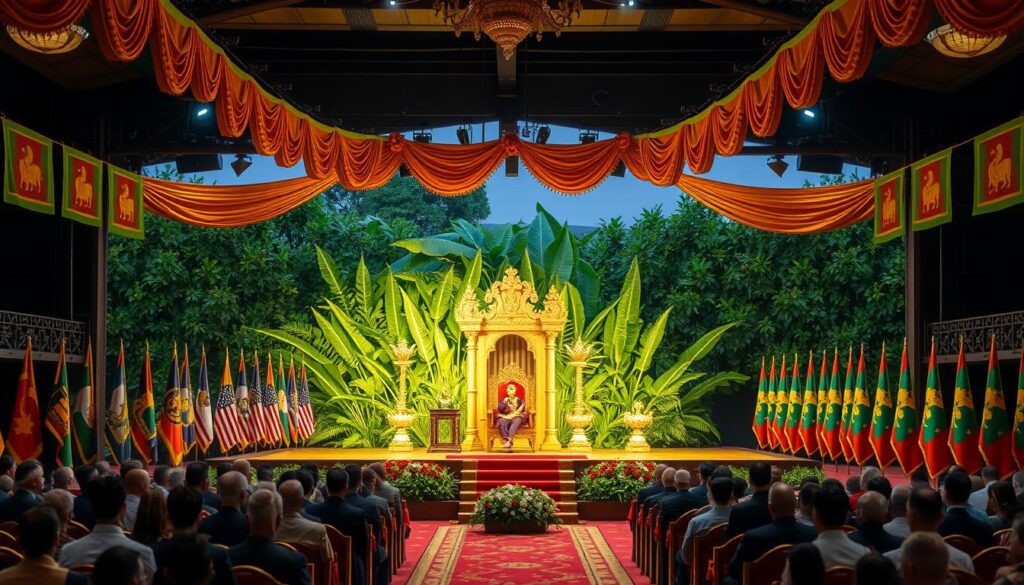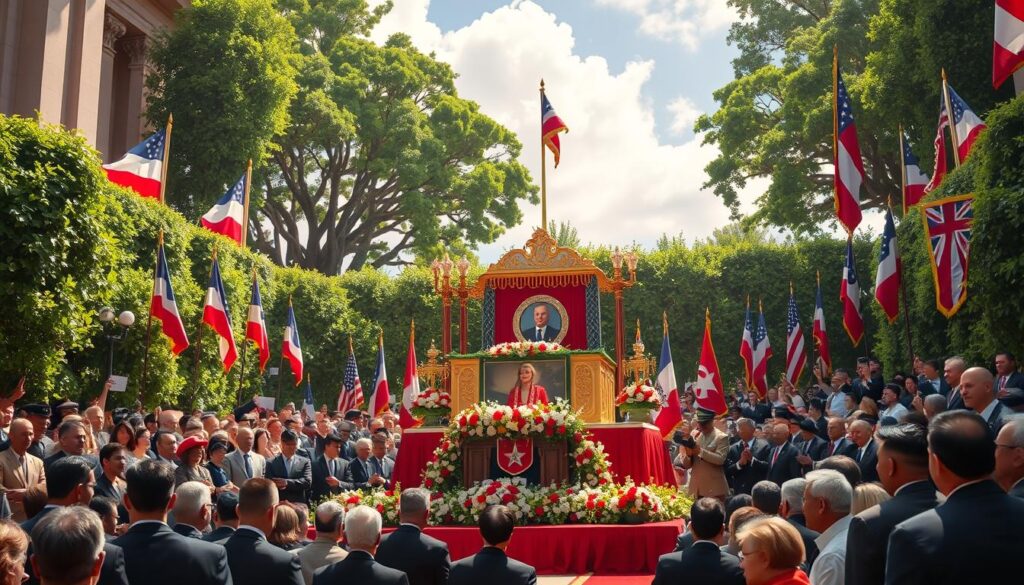Ranil Wickremesinghe Sworn in as Sri Lanka’s New President
Ranil Wickremesinghe was sworn in as Sri Lanka’s new President, stepping into leadership during an economic crisis. At 73, he becomes the eighth president, tasked with bringing stability and economic recovery. His role is crucial for the nation’s future.

His swearing-in took place in the parliamentary complex, marking the start of his presidency until November 2024. Wickremesinghe, with over 40 years of experience and six terms as Prime Minister, was voted president by parliament. This marks a significant step for Sri Lanka’s path to reform.
The Inauguration wasn’t just a ceremony. It was a promise to fix a nation struggling with inflation and shortages. Wickremesinghe faces the challenge of avoiding bankruptcy. A bailout from the International Monetary Fund is a top priority.
Wickremesinghe has held many important positions, including Minister of Finance and Minister of Defense. He has played a key role in creating major policies. However, his election has seen controversy due to his ties with the previous regime, leading to public skepticism.
Sri Lanka’s diverse population looks to him for transformative leadership. The Political News surrounding the President impacts all and carries hopes for prosperity and democracy.
The Inauguration of Ranil Wickremesinghe Amidst National Crisis
In a solemn ceremony held within the Parliament of Sri Lanka, Ranil Wickremesinghe was sworn in as Sri Lanka’s new President. This marked a crucial moment in the nation’s rough political journey. The event was attended by past presidents and watched by the Chief Justice. It unfolded against a deep economic crisis. This day was not just about changing leaders. It also brought hope for solving the nation’s problems.
Gotabaya Rajapaksa resigned after much public demand and political pressure. This was because of how the country’s money was handled. Wickremesinghe, with years of political and diplomatic work, took over as president. Even though he lost an election in 2020, his becoming president is seen as key to the nation’s stability.
Ranil Wickremesinghe’s commitment to constitutional reforms and strengthening the legislature shows his dedication. He aims to improve Sri Lanka’s governance and regain public trust.
The former prime minister, now president, has dissolved the old cabinet. This makes way for new appointments. A new approach towards Sri Lanka’s economic recovery is underway. His main goals include making the parliament stronger and taking legal steps against those causing trouble. He promised to restore law and order.
| Initiatives | Impact |
|---|---|
| Constitutional Reforms | Reduce presidential powers, enhance Parliament’s role |
| Legal Measures | Address insurgency, stabilize national security |
| Economic Strategies | Engage with IMF and creditors for financial support |
| Public Trust | Restore confidence through transparent governance |
Ranil Wickremesinghe started talks with global financial bodies. He is seeking help from the International Monetary Fund to deal with the country’s money problems. This step is vital as Sri Lanka looks for a way out of its economic hardships. This includes the rising levels of poverty.

He is also focusing on education. Plans for bettering the education system and taking care of students set a good path for growth. These plans include digitalizing schools and fall under the new educational initiatives by the government.
In conclusion, the inauguration of Ranil Wickremesinghe gives Sri Lanka hope during tough economic times. His leadership has caught the attention of the world. Everyone is looking forward to the changes he will bring to the country.
Ranil Wickremesinghe’s Political Journey and Future Outlook
Ranil Wickremesinghe becoming President of Sri Lanka marks a significant moment. Born on March 24, 1949, he first entered parliament in 1977. His journey is filled with dedication to his country’s politics. Despite challenges, such as his party losing all seats in 2020, his political and diplomatic skills helped him rise.
Public Sentiment and Political Backdrop
Opinions on President Wickremesinghe’s election are mixed. Some people are waiting to see his actions before protesting. Others are upset, blaming the past government’s problems on him. Yet, Wickremesinghe promises an inclusive government. This might lead to healing and change, moving away from previous issues.
Addressing Economic Turmoil and International Aid
Sri Lanka is facing a big economic crisis, with a $51 billion debt. Wickremesinghe’s first goal is improving the economy. His team is working on getting a $3 billion bailout package from the IMF. This is important for fixing the country’s financial and resource problems.
As prime minister from 2015 to 2019, Wickremesinghe achieved a financial win no one had in sixty years. He showed he can handle tough economic challenges.
The Legacy of the Rajapaksa Administration
The Rajapaksa family’s rule ended with many people upset about the country’s problems. Wickremesinghe, who once worked with the SLPP, now needs to fix these issues. His leadership is key to helping Sri Lanka recover and earn back people’s trust.
Here are some events and sage advice during the current presidency:
| Date | Event | Policy Impact |
|---|---|---|
| 2022 | Presidential Election | Signifies a new administrative direction away from the Rajapaksa regime. |
| 2023 | Negotiations with IMF | Crucial for securing financial aid and addressing economic recovery. |
Wickremesinghe plays a key role in highlighting Sri Lanka’s cultural heritage. He promotes Sinhala, Tamil, and English theater. This improves cultural diplomacy.
Wickremesinghe is tackling big issues as president. Both Sri Lankans and people worldwide are watching. They hope he can guide the country to a stable and successful future.
Prospects and Challenges for the New Leadership in Sri Lanka
Sri Lanka is starting fresh with Anura Kumara Dissanayake as president. This brings hope but also uncertainty. Dissanayake’s role hints at big changes in politics, focusing on reform and being accountable. The previous president, Ranil Wickremesinghe, tackled a severe economic crisis needing a $2.9 billion IMF bailout, which caused financial turbulence.
The new leadership, with unprecedented support for the JVP, must form a capable government. This government must handle the economic recovery and complex politics. Dissanayake’s win marks a shift from the past, focusing on issues like the economy, corruption, and good governance. Still, many voted for different visions of the future. The job ahead is big, requiring unity and alliances across different groups.
For Dissanayake, keeping the economy stable is key. Sri Lanka’s finances are fragile, hurt by the pandemic and old debts. He faces the challenge of gaining investor trust and managing foreign relations, balancing between India and China. With plans for new elections to back his reforms, Dissanayake’s ability to unite the country will decide his success.